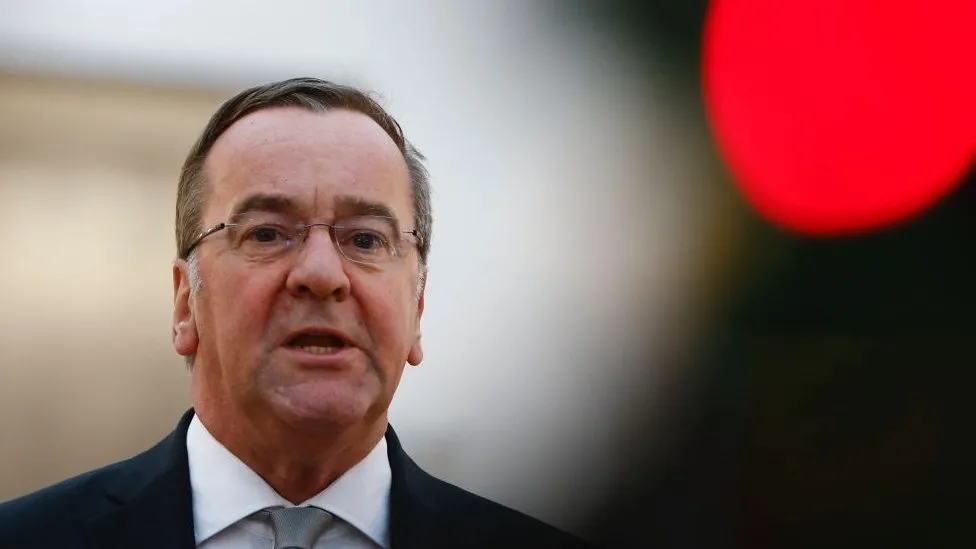Germany is scrambling to explain how an audio of air force
officials apparently discussing giving Ukraine long-range missiles was leaked
by Russian sources.
Details of alleged British operations on the ground in
Ukraine are also mentioned.
Russia's state-run RT channel posted an audio recording of
the meeting last week.
The breach has sparked major concerns about Germany's
security among allies, including France and the UK.
Germany's defence ministry has confirmed that a conversation
of air force officials was "intercepted" - but couldn't say whether
the recording had been tampered with.
German Chancellor Olaf Scholz has repeatedly ruled out
sending the Taurus missiles to Ukraine.
Nevertheless, in the recording four senior German military
officers, including Air Force chief Ingo Gerhartz and Brig Gen Frank Gräfe, are
seeminglyheard discussing the prospect of supplying Ukraine with the long-range
cruise missiles and saying the weapons could be used to hit the Kerch Bridge,
which links Russia to Crimea.
Mr Gerhartz also mentions rumours that the Taurus system
"doesn't even work".
He also suggests that German Defence Minister Boris
Pistorius has been wondering "what that would look like" if Germany
did eventually decide to provide the Taurus to Ukraine.
The men also appear todiscuss details of alleged British
operations on the ground in Ukraine and imply that Britain has been sending
personnel to help Ukrainians work the Storm Shadow missiles.
The officers say that because of the complexity of the
Taurus system, the Ukrainians would also need similar assistance and training
from German staff.
On Monday, Chancellor Olaf Scholz said having German
soldiers involved in such a task on Ukrainian soil was "completely out of
the question".
The officials discuss the logistical problems of hitting the
Kerch Bridge and say the Ukrainians would need assistance with mission planning
- which could also be seen as German involvement and a "red line for the
government".
In another section of the leaked conversation, the officials
say that the Taurus would not change the course of the war and that Germany
would send no more than 100 missiles to Ukraine.
They add that the political momentum to send the Taurus
could come from the fact that the British and French have pretty much run out
of Storm Shadows and Scalp missiles.
Tobias Ellwood, a UK member of parliament and former
chairman of the Commons Defence Committee, told the BBC that the leak was
"worrying on a number of levels".
The discussion was reportedly hosted on the Webex conference
platform rather than a secure army platform, causing further embarrassment for
Berlin.
Germany's Military Counterintelligence Service is
investigating the security breach. But it is not clear whether the results of
the investigation will be made public.
Mr Scholz's allies have resisted calls from the opposition
for a parliamentary inquiry.
The episode has highlighted divisions over Mr Scholz's
current insistence that he won't send Taurus missiles to Ukraine. Mr Scholz
fears the missiles, which have a range of around 500km (300 miles), could be
used by Ukraine to strike Russian territory.
Mr Ellwood said the leak revealed a "tension... between
senior German military who want to see Taurus dispatched and the German
Chancellor, who seems increasingly focused on his political survival rather
than what's best for the continent."
German Defence Minister Boris Pistorius is attempting to
portray the hack as an attempt by Russia to sow division. He called the leak a
"hybrid disinformation attack" aimed at "undermining our
unity."
"We mustn't fall for Putin," he said on Sunday.
For its part, the Kremlin is framing the leak as proof that
the West is directly involved in the conflict in Ukraine.
Spokesman Dmitry Peskov said on Monday that the leaked
conversation "suggests that the Bundeswehr is discussing substantively and
specifically plans to strike Russian territory."
Dmitry Medvedev, the hawkish former Russian president, said
that Russia would "not forget" the leaked conversation.
"The road of diplomacy is not yet closed, but they must
understand what we did to them during [World War Two]," he said.


